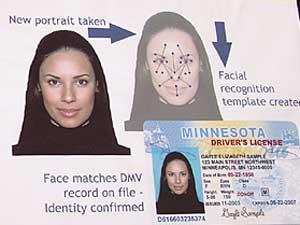|
Audio
Photos
More from MPR
Resources
|
 |
| This display shows how facial recognition technology could be used on Minnesota drivers' licenses to prevent identification theft. (MPR Photo/Laura McCallum) |
The announcement came one day after Attorney General Mike Hatch criticized the Pawlenty administration for selling drivers' license data. The dueling news conferences indicate that identity theft could be a hot topic in this year's governor's race.
St. Paul, Minn. — Gov. Pawlenty says identity theft is a growing problem in the state, with nearly 3,000 victims in 2004.
"We have statistics that show that more and more people are victims of these kinds of crimes, and we have a lot of work to do in this area, because the technology keeps changing," Pawlenty said.
As criminals' use of technology becomes ever more sophisticated, law enforcement is fighting back with technology of its own. Thirteen states use some type of facial recognition technology on their drivers' licenses. The system uses the structure of a person's face to mathematically check for identity fraud.
Pawlenty says the state's Driver and Vehicle Services could use facial recognition technology to detect fraud.
Scott Carr is vice president of marketing for Digimarc, which sells such systems. He says when someone applies for a new drivers' license, a photo would be taken and a mathematical template of the person's face would be created.
"That template would be used to probe the portrait database to find out if that face occurs on another drivers' license. The potential matches would be presented to an investigator, who could determine whether or not a drivers' license should be issued to that citizen," explained Carr. "So there's always human intervention at the end, but you're using advanced biometric technology to detect an attempt at identity fraud."
Carr adds that when someone tries to renew a drivers' license, the technology can be used to make sure the person's face matches the photo on record for that name. Carr says other states have used facial recognition to catch hundreds of potential identity theft cases each year.
The technology costs $1-$2 per drivers license. Pawlenty says a federal grant will cover much of the cost, and he'll seek legislative approval for the remaining funding.
Pawlenty is also proposing steps to try to protect personal data on computers, such as making it a gross misdemeanor to use a computer to gain unauthorized access to such information.
Attorney General Mike Hatch, who has been talking about identity theft for several years, is skeptical of Pawlenty's proposals. Hatch says he supports facial recognition technology, but says it's unlikely to have a major impact on the problem of identity theft.
"Not unless every retailer had facial detection technology there at the cash register, which I doubt is going to occur. You're dealing with a high expense item," Hatch said. "It is helpful in terms of people who show up at the department and get a drivers' license using a false name. It is helpful for that."
But Hatch says if Gov. Pawlenty is truly concerned about identity theft, he should be doing more to protect the privacy of drivers' license data. He has critized the Pawlenty administration for selling the data to private companies.
Pawlenty says his administration is following data practices law, and he has called for making more data private.
The two appear to be trying to one-up each other over who is more concerned about identity theft. The issue could be key in the governor's race. Hatch is a DFL gubernatorial candidate, and Pawlenty, a Republican, is up for reelection.
Pawlenty says the closely-timed press conferences are merely a coincidence, and both politicians say they've been talking about the issue since the late '90s.






